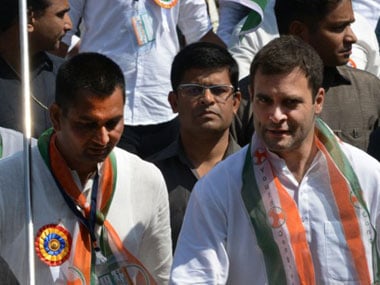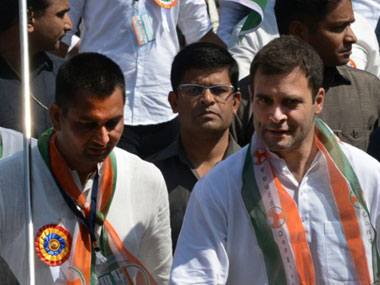You can’t blame Rahul Gandhi for not trying. Like a committed PT teacher trying to verbally flog his slothful class into shape, Gandhi, has literally emptied his lungs out screaming about the many vices of the ‘system’, Congress included. And in order to make the largely unwieldy system, somewhat systematic, Rahul Gandhi first launched Khidkee, the social Congress networking platform that seems to have disappeared from the public memory. Like we have observed in Firstpost earlier, the platform, which was launched to enable interaction between Congress workers, leaders and followers was reduced to a Congress fan page. Gandhi then announced that he would release a five-page application form which aspiring MPs will have to fill up, so that the top leadership can impartially decide on the best candidate for a given constituency. [caption id=“attachment_1406391” align=“alignleft” width=“380”]  Rahul Gandhi. AFP.[/caption] Except whimpers of protests from senior state leaders, not much was heard about it after. Now, the Hindustan Times reports, that the Congress has sought the help of market research agency Nielsen to help recognise which candidates are best suited to run for the polls. HT reports: “The exercise, a first for the Congress, began a few months ago. A core team advising Congress vice-president Rahul Gandhi on candidate selection is providing the agency with a shortlist of at least two probable candidates from the party, besides the name of the sitting MP for each of the 543 Lok Sabha constituencies.” While neither the agency nor Congress leaders were willing to confirm the tie-up, a Congress leader told Hindustan Times that popular opinion seems to be in opinion of seeing fresh faces in the Congress leadership ranks. While it’s not news that the Congress is trying every trick in the book to salvage the party’s fortunes in the upcoming elections, it is not clear why Gandhi is still hell bent on the corporatisation of Congress’ internal practices. While it is indeed necessary for Congress, or any other political party, to reorganise its leadership when time comes, the cadre-leader dynamics at the grassroots usually defies corporate discipline. Sizable armies of cadres are mobilised not by the top leadership of a party alone, but with regional leaders who speak the language of the grassroots and know the pulse of a given area well. How the survey plans to take all that into account and then suggest a suitable candidate is not known and is largely debatable. Politics being an industry of manipulation, a candidate’s success depends a lot on his/her interpersonal skills and how he/she covers up is party’s many failings. Usually, one would expect the party’s insiders to be in the know-how of the performance and the promises of its candidate - how the job being outsourced to an agency helps the cause is also debatable. Maybe the employment of the agency is a way the new Congress power players, led by Rahul Gandhi, hint the older leaders to bow out. Hiring an apolitical, corporate agency gives the older leaders no space to complain about being unfairly sidelined. It also relieves the new leadership from the burden of having to ask the older leadership to make place for the new.
You can’t blame Rahul Gandhi for not trying. Like a committed PT teacher trying to verbally flog his slothful class into shape, Gandhi, has literally emptied his lungs out screaming about the many vices of the ‘system’, Congress included.
Advertisement
End of Article


)
)
)
)
)
)
)
)
)



